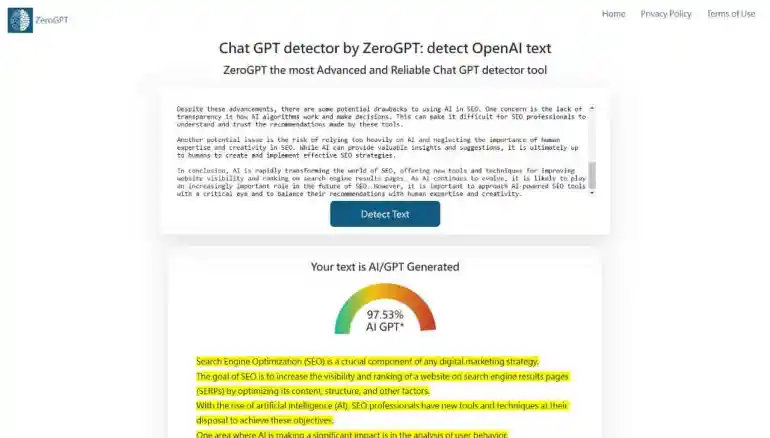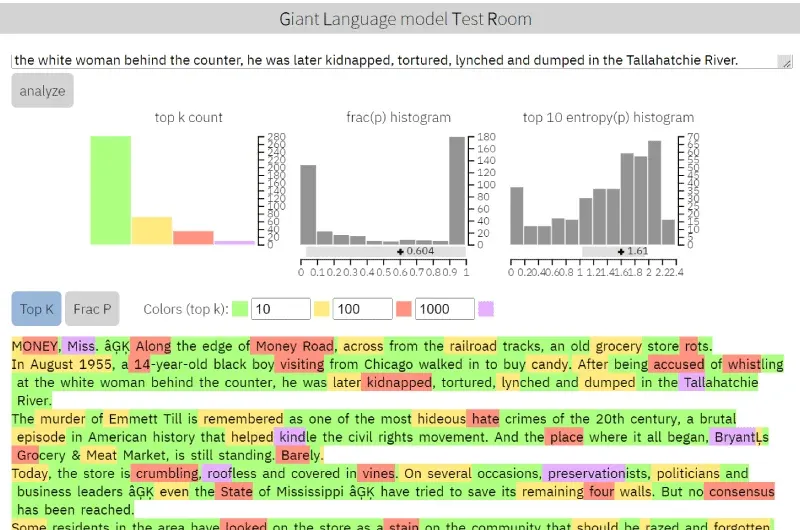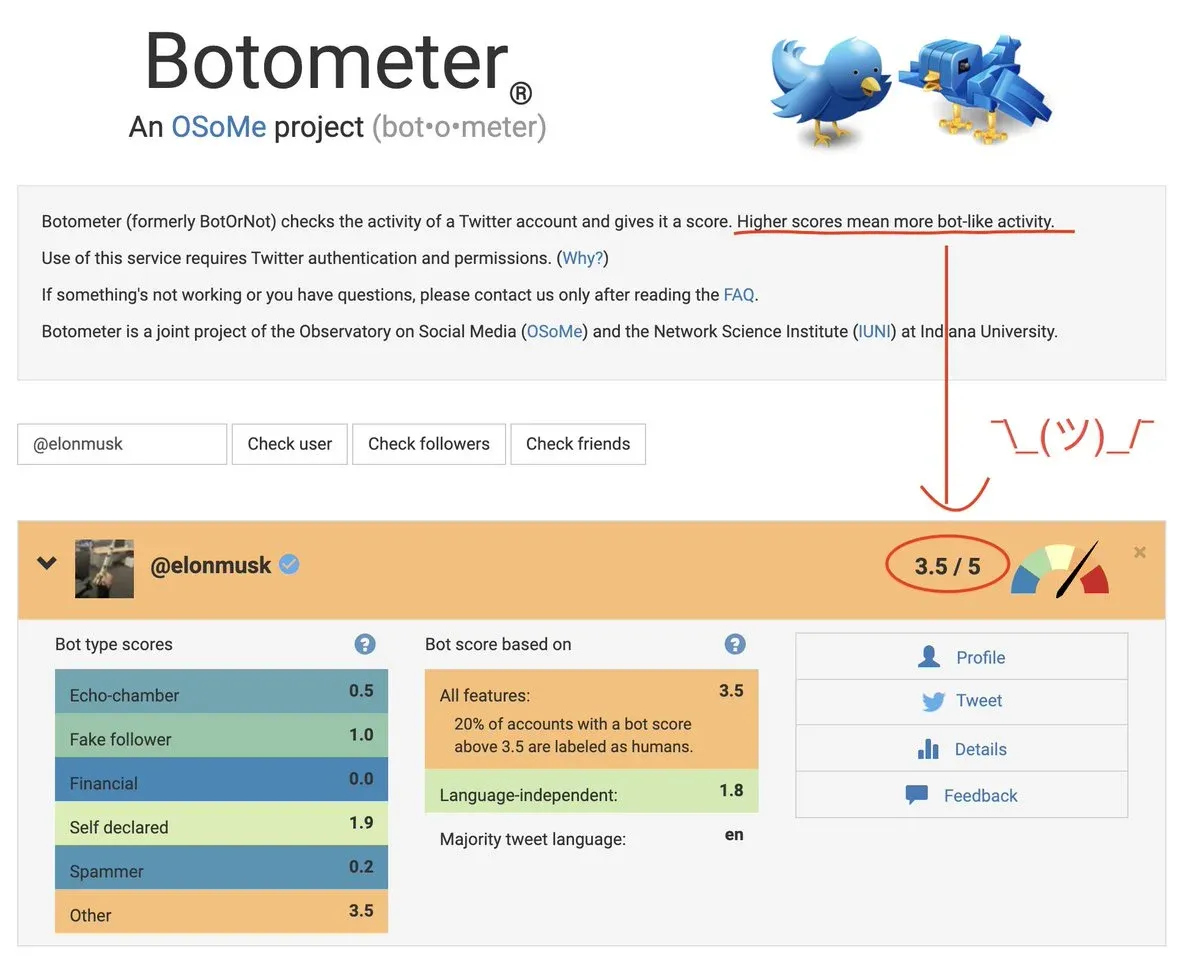AI, we've got your number! As sophisticated as AI becomes, it can't escape the keen eye of content detectors. We've got AHAs and OH NOs on them all, from ZeroGPT to a host of savvy alternatives. Thanks to these digital sleuths, we're ready to unmask AI-generated content in a heartbeat!
Mirroring the game of cat and mouse between human and machine-written content, articles like this guide you through the maze of AI content detectors. As AI-generated texts emerge with a startling human touch, our detectives are staying hot in pursuit with their toolkits of countermeasures.
So, what's inside the game? What's beyond the alternatives to ZeroGPT? It's about exploring the world of AI content detectors to weed out fakeries and embrace authenticity. We're here to unravel the who, what, why, and how of these AI investigators and dive into the questions that matter.
Is ZeroGPT accurate? Is it reliable?
How do its alternatives weigh in? Well, hold tight as we break it down! By examining the strengths and weaknesses of AI content detectors, we arm ourselves with the best tools for testing AI-generated content. And, believe it or not, we still have a few tricks left up our sleeves!
In this mind-tickling guide, we'll reveal the tips and tricks to expose AI-generated imposters hiding in plain sight. As they say, "There's nowhere left to hide," and we're here to prove it by shedding light on efficient and effective AI Content Detector options.
With this knowledge, we can play our own part in keeping the content world true to its essence—genuine, unbiased, and undeniably human. So, hop on board as we venture into the shadowy realm of AI content detection and tackle the big questions brewing in your mind!
Understanding ZeroGPT
ZeroGPT is one of the AI detection tools that's been making waves. It uses advanced technology to analyze and understand whether a given piece of text was created by AI instead of a human. How accurate is ZeroGPT?

Truth be told, like any AI tool, ZeroGPT isn't infallible. When it comes to detecting AI-generated text, accuracy can vary based on the complexity and style of the text. That said, ZeroGPT does offer an impressive level of accuracy most of the time.
Is ZeroGPT reliable? While it certainly holds promise for many applications, it’s not the complete solution to AI text detection, especially in nuanced situations. Its reliability, much like its accuracy, relies heavily on the task, its understanding of the input, and the specific use case.
The thing about ZeroGPT, as with any tool, is that it won't be perfect for every situation or every user - there's always a possibility you'll need an alternative to ZeroGPT. This is where exploring zerogpt alternatives becomes relevant.
As with any tool, you'll come across different strengths and weaknesses when you start evaluating zerogpt alternatives. You never know, you might just discover an AI tool that aligns better with your requirements. And that's the very reason why you might be looking for an alternative to ZeroGPT. Trying different tools could lead you to a more accurate and reliable method for detecting AI-generated content.
Five Alternatives to ZeroGPT
In the world of AI detection, ZeroGPT has companions—and some strong ones at that.
Here are five real-life zerogpt alternatives, each an AI content detector in its own right, with a low-down on how accurate and reliable they are.
1. GLTR
GLTR, short for Giant Language Model Test Room, steps up as an alternative to ZeroGPT.
This tool is designed by the brains at Harvard and MIT-IBM Watson AI Lab. It examines a text and highlights which words are statistically too predictable (a sign of AI).

Is GLTR accurate?
For the most part, yes. It's best at spotting texts produced by earlier AI models, though it might struggle with the newest ones which are becoming more human-like. Still, GLTR is a reliable choice for a quick check.
2. OpenAI’s Detector
OpenAI, the creator of GPT-2 and GPT-3, has its own AI Content Detector. It’s built to understand nuances that come with texts generated by OpenAI’s models.
Is OpenAI's detector accurate? It rates high on accuracy and reliability when it's your own OpenAI generated content you're checking, but with content from other models, the certainty drops a bit.
3. Grover Detector
Developed by the Allen Institute for AI, the Grover Detector is another fine zerogpt alternative.
It's trained on the Grover model, which means it goes about detecting AI-written content by recognizing its 'own kind'.

The Grover Detector scores well on the accuracy chart, but remember, no AI Content Detector is perfect.
4. Hugging Face’s Transformer
Though not solely an AI content detector, Hugging Face's Transformer deserves a spot here. Importantly, how does it stack up—is Hugging Face's detector accurate?
Since the Transformer models are versatile, you can tailor them for detection, which means with the right tweaks, they can be reliable. Yet, it might require some coding chops to get it working just right.
5. Botometer
Finally, we have Botometer (formerly BotOrNot), typically used to sniff out social media bots but can also serve as an AI Content Detector.
It checks writing patterns, network and content features, and makes a call on whether it's likely bot-generated.
Now, is Botometer reliable?
In the world of social media, quite. But for detailed text scrutiny, it's a bit broad-stroked.
Digging into the landscape of zerogpt alternatives, what becomes clear is no tool is the be-all and end-all. Each detector has its own version of 'is it accurate?' and 'is it reliable?' to answer. They specialize in different types of detection, they handle nuances in varying degrees, and they come with their own set of strengths and limitations.
When you're seeking an alternative to ZeroGPT, your focus is often on how well an AI can decipher the subtleties of another AI's text. These alternatives range in that capability.

Some, like GLTR, are fantastic at flagging the overly predictable. Others, like OpenAI's detector, sync well with their own AI content. Then there are ones like the Hugging Face Transformer, which offer you a sandbox to build your own accurate and reliable detective work.
In essence, each tool has a 'sweet spot'—their own corner of the AI detection ring where they throw the best punches.
It's more about matchmaking—finding the AI Content Detector that meets your text at its point of need, not just accepting "is ZeroGPT accurate?"
as your only question. Each tool's reliability and accuracy will mirror the context you place it in.
Choosing an AI content detector is much like picking a new phone. You wouldn't grab the first one you see; you'd look for the features that fit your life. Same here. Delving into the pros and cons of each zeorgpt alternative is key. Consider your specific needs. Do you want general reliability, or are you hunting for accuracy in the fine prints? Maybe you need a tool tuned to social media content, or one that's a whiz at detecting a certain type of AI's work.
In sum, these zerogpt alternatives offer diversity. They're like different lenses to look through, with varying degrees of zoom and focus. Each tool is fighting the good fight against AI's adeptness at mimicking human writing—but none is a catch-all. They're tools, not magicians. Always apply a dash of human judgment to the mix for the best results.
Focus on AI Content Detectors
Shining a light on AI content detectors, there's a lot to see. These tools help us separate the human-written wheat from the AI-generated chaff. With alternatives to ZeroGPT and other such detectors, we can get precision and clarity in our quest to authenticate content. So, let's take a closer look at what AI content detectors are, and why we need them.
AI content detectors, as the name suggests, are tools designed to spot content that's penned by AI, not humans. While powerful AI models like GPT-3 can churn out text that's nearly indistinguishable from something a human might write, AI content detectors come to the rescue.
They scrutinize writing patterns, word choices, and other features to determine whether it's human or machine-made. Ultimately, it's their job to answer our questions like, "is ZeroGPT accurate?" or "is ZeroGPT reliable?" for various use cases.
Though there's no foolproof method—even the best detectors won't catch every subtle hint—there are plenty of zerogpt alternatives to pick from. Each one brings its perspective on accuracy and reliability, especially given the growing sophistication of AI models.
So, why do we need AI content detectors? Although many AI-generated materials have valid uses, there are also risks. For instance, deepfake articles or fake news can be quite concerning. AI content detectors can help us spot and remove potentially deceptive or malicious content.
They also play a key role in ensuring that plagiarized or autoregenerated work doesn't make it into academic publications. Bottom line: we need AI content detectors to keep our content authentic, genuine, and human-centric.
Now that we understand why these AI detectives are vital, it's crucial to know your options. Since no detector is perfect, it's handy to explore alternatives to ZeroGPT and other tools.
Zerogpt alternatives run the gamut—some are built by academics, others stem from AI pioneers or tech researchers. Each has its niche; some are strong in spotting AI models of their own creation, while others fare well with a certain type of content. The key lies in finding a detector that meets your needs.
As you evaluate the efficiency and reliability of different AI content detectors, remember that AI isn't stagnant. Newer, more human-like models are emerging all the time. So, the question of "is ZeroGPT accurate?" or "is ZeroGPT reliable?" will keep shifting beneath our feet. This constant evolution means that the world of AI content detectors and alternatives must keep up in the race against time.
To sum up, AI content detectors and their many zerogpt alternatives play a huge role in the battle for authentic content. By engaging these tools, we can identify and weed out AI-generated texts that may blur the line between human and machine writing. With AI technology growing by leaps and bounds, it's essential to have reliable and accurate detectors in our arsenal—helping us keep our content ecosystem honest, trustworthy, and genuine.
Conclusion
In wrapping up, it’s clear that finding the right AI content detector is key. Not every tool is a perfect fit for all. It's about your specific needs. Check out zerogpt alternatives to find what works for you.
Ask yourself if the detector you're looking at can handle the content you're dealing with. Test a few, see what sticks. The question "is ZeroGPT reliable?" depends on who's asking and what they're checking.
So, stay sharp, keep questioning, "is ZeroGPT accurate?" and match the tool to the task. AI's always changing, and we need detectors that keep up. That's our best bet for keeping our content real.
Frequently Asked Questions (FAQs)
 Can an AI content detector differentiate between different AI models like GPT-2 and GPT-3?
Can an AI content detector differentiate between different AI models like GPT-2 and GPT-3?
Some detectors may struggle to differentiate between AI models, as each generation becomes more sophisticated.
It's often easier for a detector to spot texts by older models than newer ones.
Can AI content detectors spot real-time, AI-generated content online?
Most detectors are not designed for real-time detection, but some can analyze content after it has been created.
Can you train AI content detectors on specific AI models for better accuracy?
Indeed, many models are trainable and can be finetuned on specific AI models to enhance their detection capability.
Are there open-source zerogpt alternatives available for experimental uses?
Yes, some AI content detector solutions like GLTR and Hugging Face's Transformer offer open-source platforms that researchers can use experimentally.


